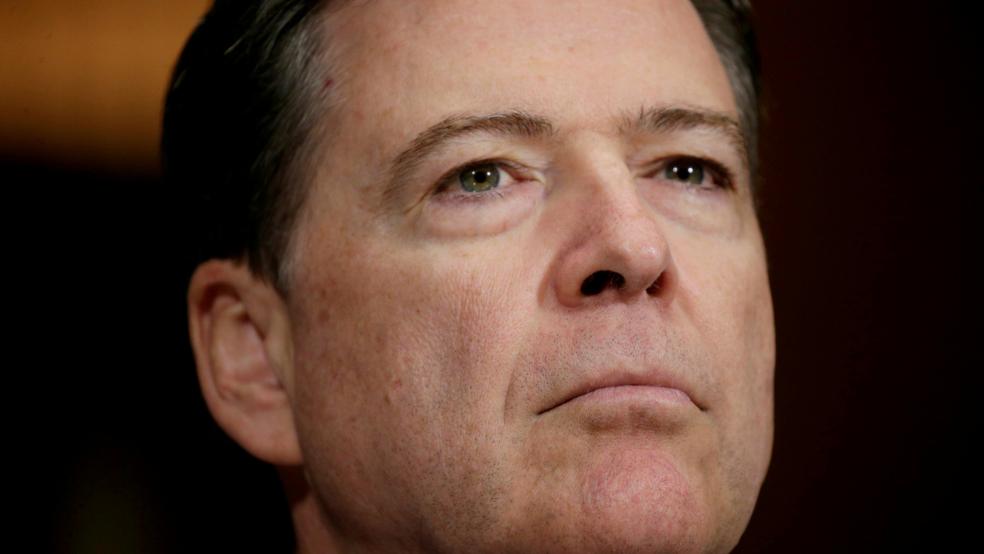Following Thursday’s appearance by former Federal Bureau of Investigation director James Comey before the Senate Intelligence Committee and the subsequent reaction to his testimony from the White House, the temptation is to allow the question of what went on between the President and his FBI director earlier this year devolve into a he-said-he-said narrative. But it’s not.
Comey called Trump a liar, both directly and indirectly. He said that Trump and his surrogates had told “lies, plain and simple” about the internal state of the FBI in the months prior to Trump firing Comey in early May. He said that Trump lied about Comey soliciting a one-on-one White House dinner with the president, and about what they had discussed during it.
Related: Here’s the Part of Comey’s Testimony That Could Come Back to Haunt Him
He said that he took to writing down detailed notes about his meetings and phone calls with Trump immediately afterward because he was “honestly concerned that he might lie about the nature of our meeting.”
Not long after his testimony, the White House sent Trump’s personal attorney, Marc Kasowitz, to the National Press Club in Washington where he read a statement that in effect, accused Comey of lying to the Senate.
To Comey’s claim that Trump asked him to drop an investigation of former National Security Adviser Michael Flynn after clearing the Oval Office of senior members of his administration, Kasowitz said that Trump, “never, in form or substance, directed or suggested that Mr. Comey stop investigating anyone, including suggesting that Mr. Comey ‘let Flynn go.’”
Related: The Only Person Who Can Bring Down Trump Is Sitting in the Oval Office
He also denied Comey’s claim that Trump had asked for his personal loyalty, saying, “The President also never told Mr. Comey, ‘I need loyalty, I expect loyalty’ in form or substance.”
While Kasowitz’s statement could, conceivably, leave room for him to claim that Comey was simply mistaken, Trump went on Twitter Friday morning and removed all doubt about the administration’s position with regard to the former FBI director.
Despite so many false statements and lies, total and complete vindication...and WOW, Comey is a leaker!
— Donald J. Trump (@realDonaldTrump) June 9, 2017
So, we have two men calling each other liars, based on their recollections of conversations in which nobody other than the two of them was present. Under other circumstances, it really would be a classic he-said-he-said situation in which the listener had little basis for discerning the actual truth of what happened.
Related: 4 Major Questions Comey Must Answer About Trump
Except that’s not really what’s happening here. More properly, on one side of the equation we have “he-said-while-under-oath-and-risking-penalty-of-perjury” while on the other, we’ve got “he-tweeted.” In other words, it’s not the same thing at all.
Even without taking into consideration the public reputation of the two men involved, Comey’s testimony on Thursday simply carries more weight than either Trump’s statement through his attorney or his tweet, simply because of what Comey placed on the line.
He didn’t just risk destroying his personal reputation with Thursday’s testimony. He placed himself at risk of criminal prosecution and jail time if he lied under oath to Congress.
And as he did so, he effectively dared the president to produce audio tapes of their conversations, which Trump insinuated -- again, in a tweet -- that he might possess. If Comey was lying, the tapes alone could send him to prison.
Related: Comey Returns to Capitol Hill – But Will His Credibility?
True, this could be the equivalent of a poker player with a pair of threes pushing all his chips into the middle of the table in a desperate attempt to bluff his way to victory. But it would be an odd gamble indeed for Comey, who isn’t trying to avoid other kinds of legal jeopardy, and who already has his pick of insanely lucrative private sector jobs waiting for him whenever he wants, to take one.
And all this ignores the respective public reputations of the two men involved in this dispute.
Despite Deputy White House Press Secretary Sarah Huckabee Sanders’ insistence on Thursday that “The president is not a liar,” there is really no reasonable question about the fact that Trump frequently and knowingly spreads false information -- that is, he lies -- on a regular basis.
People may dislike Comey for multiple reasons. He has given members of both parties plenty of reason over the years. But in two and a half hours of testimony on Thursday, his truthfulness was not questioned by either Republicans or Democrats. The closest any came to disputing his version of events was to challenge his interpretation of President Trump’s intentions in his comments about Flynn.
Related: Intel Chiefs Avoid Questions on Trump, Turning Up the Heat on Comey
The path forward for Trump here ought to be simple. He can even up the credibility balance by putting just as much on the line in this dispute as Comey has done. (Or, more realistically, as he doesn’t enjoy Comey’s reputation for truthfulness, he can try to come as close as possible.)
To do that, he could offer a sworn statement to Congress under the same threat of perjury that his former FBI director now faces. If he’s feeling particularly daring, he could even offer to testify in person and take questions.
He could, if they actually exist, release the tape recordings of his meetings with Comey.
He could do any or all of these things.
But on this hand, at least, Trump is more likely to look at the stack of chips Comey has pushed into the pot, assume the former FBI director is holding something a lot better than a couple of threes, and look for a way to fold without losing too much face.





